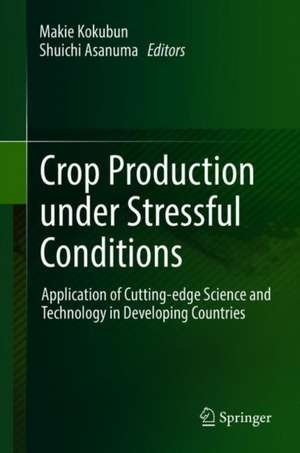Crop Production under Stressful Conditions: Application of Cutting-edge Science and Technology in Developing Countries
Editat de Makie Kokubun, Shuichi Asanumaen Limba Engleză Hardback – 21 aug 2018
In addition to presenting novel scientific findings, this book highlights practical field studies that verify the effectiveness of the scientific findings in actual environments. The achievements will help to improve crop production worldwide, and the lessons learnt will be useful in re-designing strategies to address global issues in crop production,particularly in developing regions. Lastly, the outcomes discussed will be useful to policymakers and professionals engaged in crop production and food security in developing countries, as well as researchers and students.
| Toate formatele și edițiile | Preț | Express |
|---|---|---|
| Paperback (1) | 569.51 lei 38-44 zile | |
| Springer Nature Singapore – 22 dec 2018 | 569.51 lei 38-44 zile | |
| Hardback (1) | 558.76 lei 38-44 zile | |
| Springer Nature Singapore – 21 aug 2018 | 558.76 lei 38-44 zile |
Preț: 558.76 lei
Preț vechi: 689.83 lei
-19% Nou
Puncte Express: 838
Preț estimativ în valută:
106.93€ • 111.23$ • 88.28£
106.93€ • 111.23$ • 88.28£
Carte tipărită la comandă
Livrare economică 10-16 aprilie
Preluare comenzi: 021 569.72.76
Specificații
ISBN-13: 9789811073076
ISBN-10: 9811073074
Pagini: 240
Ilustrații: XIV, 212 p. 61 illus., 47 illus. in color.
Dimensiuni: 155 x 235 x 13 mm
Greutate: 0.5 kg
Ediția:1st ed. 2018
Editura: Springer Nature Singapore
Colecția Springer
Locul publicării:Singapore, Singapore
ISBN-10: 9811073074
Pagini: 240
Ilustrații: XIV, 212 p. 61 illus., 47 illus. in color.
Dimensiuni: 155 x 235 x 13 mm
Greutate: 0.5 kg
Ediția:1st ed. 2018
Editura: Springer Nature Singapore
Colecția Springer
Locul publicării:Singapore, Singapore
Cuprins
SATREPS program challenging global issues on food security: Overview.- Development of rice promising lines using genomic information in Vietnam.- Tailor-made rice breeding and cultivation technology for Kenya’s environment.- Development of flood- and drought-adaptive cropping systems in Namibia.- Improving resources utilization efficiency in rice production systems with contour-levee irrigation in Colombia.- Development of wheat breeding materials using genetic resources in Afghanistan.- Biotechnology to generate a drought-tolerant soybean in Brazil.- Management of invasive pests in cassava in the greater Mekong subregion.- Control of witchweed (Striga) through chemical, biological and ecological methods in semi-arid regions in Sudan.- Bringing stability to world food supplies with Japanese technology and Mexican genetic resources.- Lessons learnt from SATREPS projects and perspectives.
Notă biografică
Editors:
Dr. Makie Kokubun
Professor emeritus, Tohoku University, Sendai, Japan
Dr. Shuichi Asanuma
Professor emeritus, Nagoya University, Nagoya, Japan
Textul de pe ultima copertă
This book presents field studies on crop production in developing countries such as Vietnam, Kenya, Namibia, Colombia, Afghanistan and Sudan. Further, it examines the achievements of SATREPS, a development assistance program sponsored by the Japanese government that promotes international joint research to address these global issues. In this context, multidisciplinary research teams consisting of breeders, physiologists, soil scientists, agronomists, and other scientists related to agricultural development worked together to tackle the challenges involved in enhancing the capacity of crop production in the respective regions.
In addition to presenting novel scientific findings, this book highlights practical field studies that verify the effectiveness of the scientific findings in actual environments. The achievements will help to improve crop production worldwide, and the lessons learnt will be useful in re-designing strategies to address global issues in crop production, particularly in developing regions. Lastly, the outcomes discussed will be useful to policymakers and professionals engaged in crop production and food security in developing countries, as well as researchers and students.
Caracteristici
Introduces a unique framework for research collaboration and human capacity development that addresses global issues in crop production in developing countries Provides successful examples of the application of cutting-edge science and technologies to solving problems in developing regions Amply demonstrates the need for and effectiveness of multidisciplinary approaches to tackling issues on agriculture
